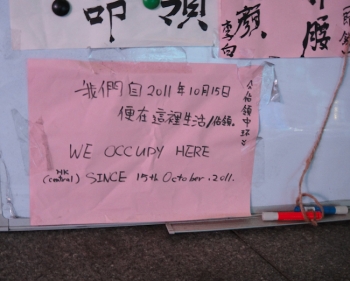The world economy has been going through a crisis since the summer of 2007 and this turmoil affects the normal rhythm and fluctuations of stock prices, currency rates, and financial institutions, in negative ways that the devastation has reached almost every corner of the globe both economically and socially. Countless discussions have continued between academia, organizations, and individual citizens regarding the economic and political systems of capitalistic countries. One significant manifestation of such critique is the recent ‘Occupy Movement’ that began with the Occupy Wall Street (OWS) movement in New York in September of this year – spreading outwards to 1,500 other cities within months in a manner of engaged global citizens uniting in their protest. Why is this movement catching on so fast?
OWS began in the heart of a major financial district: Wall Street, in New York City, as a protest against the US government and the banking sector. One outstanding slogan of the Occupy Movement is “We are the 99%.” It refers to the enormous income gap between the top 1% wealth of society and the rest of the population. In the effort to contain the financial crisis a few years ago, the US government used taxpayers’ money to bail out the collapsing investment banks and one large insurance company, which lead to the perception that much of the “1%” wealth seems to be concentrated in favoring large financial institutions. The outcome of the bailout seemed to have caused a domino effect of negative attitude on the global economy and banks in general. Since the collapse, many governments of the most affected countries of the economic downturn are either implementing, or preparing, austerity measures to balance the budget deficits caused by the financial crisis. While the global economy struggles to find a balance, social welfare is being reduced so that the income inequality between the 99% and the 1% continues to widen and emphasize the gap.
The OWS movement sustains its momentum because it strikes a chord in the hearts of people living in modern capitalistic societies. Emmanuel Saez, a professor at the University of California, Berkeley, and director for the Center for Equitable Growth says that market economies have been successful at producing growth, but this growth often comes with large economic disparities. Since people living in society care about how they do relative to others, hence inequality, it can stir passion among the broader public.[1] Such uproar can lead to both a complaint about economic inequality created by laissez faire capitalism, as well as point to the seemingly boundless desires of the 1% wealth class who appear to hoard the wealth created by the consumerist culture.
Buddhist Critique of Laissez Faire Capitalism
Many leading sociologists, philosophers and a number of economists[2] have pointed out that increasing income and wealth inequality is the result of laissez faire capitalism. Some economists have indicated a consensus view about equating the success of laissez faire capitalism with material progress. But this generally applies to a privileged class only; other than the 99% mentioned in the protest movement - people in the developing world who suffer more severely from very basic human challenges: poverty, malnutrition, hunger, ignorance, ill health and environmental degradation. Does this bring into question the basic meaning of life? It would seem that the modern economic activities are approached with too much self-centeredness and while in the process of contributing to economic growth, almost entirely neglect economic development.[3] Adam Smith gave an example in his Wealth of Nations which is believed to be the impetus of modern capitalism, and to explain the rationale of modern capitalism: ”it is not from the benevolence of the butcher, the brewer, or the baker that we expect our dinner, but from their regard to their own interest. We address ourselves, not to their humanity but to their self love, and never talk to them of our necessities but of their advantages.”
The butcher and the others in this example are not necessarily motivated by kindness or compassion towards others, but are driven by personal self-gain that can lead eventually, and unfortunately to greed and deceit. In the Anguttara Nik?ya there is a well-known parable when the Buddha described such a person as a one-eyed person - one who knows how to acquire and increase his wealth but does not have the eye of ethics of good and bad. The one-eyed person acquires wealth by both right and wrong means. Whereas, the two-eyed person is one who can acquire wealth righteously with proper ethics, and additionally have the sight to balance his economic prosperity with wisdom. Instead of creating mistrust and fear, Buddhism emphasizes respect and consideration towards each other when engaged in an economic activity. The Sig?lov?da Sutta describes a working environment, which is based on mutual understanding, respect, and consideration. An employer, for example should “arrange their employees’ work according to their strengths, by supplying them with food and wages, by looking after them when they are ill, by sharing special delicacies with them, and by letting them off work at the right time.” (DN 31: III 191; Bodhi (2005) 118). In return, the employees should do their work properly and uphold and respect the employer’s reputation.
Buddhist teachings refute the self-interest motive by stating that those who understand true happiness from sharing, will always give and share. Praise is given to those who dispose of their wealth in a manner that is shared and will benefit others. Bhoga sukha is the satisfaction derived by enjoying and donating the wealth earned righteously.[4]
“O monks, if people knew, as I know, the result of giving and sharing, they would not eat without having given, nor would they allow the stain of niggardliness to obsess them and take root in their minds. Even if it were their last morsel, their last mouthful, they would not eat without having shared it, if there were someone to share it with.”
(It 26; 18-19; Bodhi (2005)19)
Buddhist Critique of Consumerism
Let us for a moment consider consumerism, which results from a materialistic approach. Modern economics measure the “standard of living” by the amount of annual consumption - assuming that a man who consumes more, is “better off” than one who consumes less. Under such materialistic logic, consumption becomes the end goal and purpose of all economic activity. This leads to maximizing consumption, which in turn fuels an optimal productive effort. The need for indulging human satisfaction sharpens the focus for maximizing production and consumption. Such a belief is further aggravated by the corporate culture of generating maximum profit with minimum cost. In the striving process, these corporations incite emotions of maximum greed and desire which fires up the consumerist culture, which desires products that illogically exceed normal human needs. Worse yet, sophisticated and intensive marketing/advertising campaigns ingrain in the popular belief that happiness can only be achieved from indulging one’s desires in acquiring infinite wealth, and the enjoyment of limitless commodities in terms of quantity and lavishness. (Bodhi (2000) 16-18)
According to the Buddhist point of view, consumption is simply a means to human well-being. However when one indulges for the purpose of feeding desires, this can lead to ignorance and an increase in suffering. Such process is succinctly described by Bhikkhu Bodhi (2000, 18-19): “ignorance infiltrates our cognitive systems; it issues in a series of “distortions” (vipall?sa) which infect our perception (sañña), thinking (citta), and views (di??hi). The Buddha mentions four such distortions: the notions that impermanent is permanent, that the painful (or suffering) is pleasant; that the insubstantial is a self, and that the unbeautiful is beautiful… Finally… we adopt views... that affirm the mistaken notions of permanence, pleasure, selfhood, and beauty.”
Such distorted views lead to suffering in man and hoarding of wealth in order to satisfy the limitless desires.
“Riches ruin the foolish, but not those in the quest of the Beyond; through craving for riches, the foolish one ruin himself as (if he were running) others.
(Dhp. 355)
In Buddhism, wealth itself is not evil, but man’s endless craving for wealth is the challenging issue at hand. While the materialist person is mainly interested in accumulating goods, a practicing Buddhist is mainly interested in liberation. Contentment is truly of great wealth. And wisdom is better than wealth as it leads to the highest goal in this life.
Conclusion
Perhaps the lessons to be learned from considering the effects of capitalism and consumerism, and the financial crisis in our modern societies, are warnings of greed in our consumptive practices and lack of self-discipline in our accumulation of wealth.
Three years along, the people are voicing their concerns in protest of markets filled with extreme speculation and greed. Something more fundamental needs to be changed, and it is not merely the ruling party or an economic system. What needs to be changed is the perspective of happiness. Happiness can be attained by the virtue of right livelihood, including righteous means of earning wealth, which includes the ethics and wisdom of sharing and giving. As the Buddha pointed out more than 2500 years ago, satisfying the boundless desires cannot attain true happiness. Therefore, economic development must consider and include reduction of poverty and wealth inequality first, before true economic growth can prevail for all those in society. The potential is there for us all.
REFERENCES
Bodhi, Bhikkhu. In the Buddha's Words: An Anthology of Discourses from the Pali Canon. 1st. Boston: Wisdom Publication, 2005.
Bodhi, Bhikkhu. Facing the Future, Four Essays. Kandy: Buddhist Publication Society, 2000.
[1] Excerpt from a Q&A with Professor Saez by Kathleen Maclay from the UC Berkeley News Center (online) on Oct 7, 2011. Retrieved from
http://newscenter.berkeley.edu/2011/10/07/wall-street-protests-echo-researchers-findings-on-growing-income-gap/
[2] Leading figures include sociologist Slavoj Zizek, philosopher Noam Chomsky, and economist Emmanuel Saez.
[3] Economic growth refers to increase in per capita income and economic development refers to reduction of poverty, inequality and unemployment.
[4] Anana Sutta in Anguttara Nikaya, 2.


















